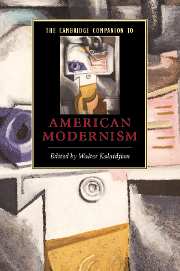4 - Modern American drama
from Part I - Genre
Published online by Cambridge University Press: 28 May 2006
Summary
“Any account of American drama must begin by noting the casual disregard with which it has been treated by the critical establishment. There is no single history of its development, no truly comprehensive analysis of its achievement. In the standard histories of American literature it is accorded at best a marginal position.”
- C. W. E. Bigsby, Modern American Drama, 1945-1990 (1992)As disconcerting as it may be, C.W. E. Bigsby's observation about the “casual disregard” American drama has suffered is true, perhaps even understated. Indeed, writing just a few years earlier than Bigsby, Susan Harris Smith more pointedly characterized American drama as an “unwanted bastard stepchild,” the most “maligned” and “unjustly neglected” area of American literary studies. She's right. Consider, for example, the paradoxical situation in which well-known critic Harold Bloom found himself in introducing two books on Arthur Miller, whose plays Death of a Salesman (1949) and The Crucible (1953), among others, remain central to the American theatrical repertory. In his “Introduction” to a 1987 collection of critical essays on Miller, Bloom identifies what he regards as the “half-dozen crucial American plays”: Death of a Salesman, which he disparages as reading “poorly”; Eugene O'Neill's The Iceman Cometh (1939, first produced, 1947) and Long Day's Journey Into Night (1939-1941, first produced, 1956); Tennessee Williams's A Streetcar Named Desire (1947), Thornton Wilder's The Skin of Our Teeth (1942), and Edward Albee's The Zoo Story (1958). This list is striking not only because of its brevity, but because of the implication that no drama prior to the 1940s - the decade in which four of these six plays had their premieres - is “crucial” to the American stage. Bloom wonders aloud how a country that can claim such novelists as Nathaniel Hawthorne, Herman Melville, Mark Twain, and William Faulkner, and poets like Walt Whitman, Emily Dickinson, Elizabeth Bishop, and Wallace Stevens can “offer us only O'Neill, Miller, and Williams as its strongest playwrights.”
- Type
- Chapter
- Information
- The Cambridge Companion to American Modernism , pp. 102 - 126Publisher: Cambridge University PressPrint publication year: 2005
- 1
- Cited by

